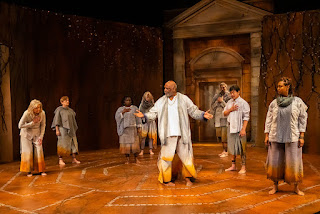Birth of tragedy as the signal of suffering under fate: 'Oedipus' at IRT
 |
| Oedipus tries to retain the control Thebes expects of him. |
James Still's direction of "Oedipus," Indiana Repertory Theatre's production of Sophocles' tragedy, so powerfully represents the story that you could almost follow all the action without hearing much of what's said. Yet what's said thoroughly reinforces the action, with a mode of delivery that is bold, rhetorically elevated and definitely outside the conversational manner to which most theater grounded in realism has accustomed us.
The cast's gestures and movement (credit also to Mariel Greenlee), headed magnificently in the title role by David Alan Anderson, are continually revealing. The set, showing facades of ancient Thebes fronted by a plaza on which the action flows, has formidable gates to the royal palace at upstage center.
Carey Wong's design conveys a feeling of timelessness. Sara Ryling Clement's costumes remove the action from anything familiar to us: robes and bare feet allow for the flow to be maximized —no awkwardness in sandals has to be smoothed out. All the awkwardness is in the peril the characters face and the burden of knowledge they come to bear.
 |
| Blind Tiresias sees into the king's heart. |
It's not a spoiler worth avoiding to say that the self-blinded king's last line responds to the Chorus' reminder that all life is suffering. Defeated in both power and love, Oedipus responds: "Until..." (a line original to the adaptation by David Daniel). The ellipsis will be filled in unanimously by everyone who sees this play.
The search for truth about a royal murder is driven by the king's curiosity. Anderson's Oedipus impresses upon the Theban community his sincerity about taking the path toward truth in whatever direction it requires. His encounter with Tiresias, the blind seer hauntingly played by Lisa Wolpe, angers him immeasurably. In all eras, powerful leaders resist unwelcome news with fierce exercises of their authority. The scene was given an extra dimension in Anderson's and Wolpe's performance Sunday afternoon.
The bond between Oedipus and Jocasta, the Theban queen harboring a darker secret than Oedipus has had any reason to suspect, was given full-bodied intensity. Mary Beth Fisher presented a fascinating portrait of the toll a divided consciousness (and conscience) can exact; her exit scene had an immense pathos.
About on the same level was Sola Thompson, as One from Within, reporting in anguish to her fellow Thebans the death of Jocasta and the self-wounding of Oedipus. Earlier, two rustic bringers of truth to the resistant king were effectively played by Jan Lucas, tremulous and fighting to hold back her secrets, and Ryan Artzberger, cleverly mining the play's thin vein of humor as a giggling rube with a gift of gab.
As brother-in-law Creon, Trieu Tran conveyed sardonic ambivalence and a mounting sense of
 |
| Jed Feder draws a bow to produce an eerie sound. |
triumph as a kind of accomplice to the fate visited upon Oedipus. And among the supporting roles well-filled by Olivia D. Dawson was that of a Priest, linking the royal city's troubles to the community's religious underpinning.
Essential to the atmosphere of a production so well blending sound and sight was Jed Feder's performance as a percussionist from an array at one side of the stage, in addition to his duties in the Chorus.
This "Oedipus" has some unexpected humor in a few colloquial expressions Daniel has inserted. The most succinct and surprising gets right to the point of the story. The tragic meaning is communicated across the millennia: a member of the Chorus reminds us that "we are all fate-fucked."
[Photos by Zach Rosing]
Comments
Post a Comment